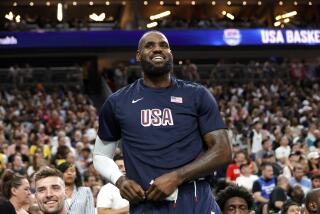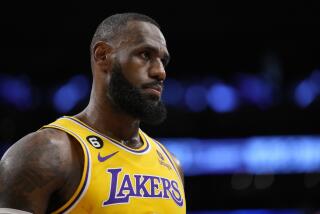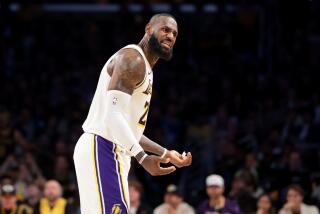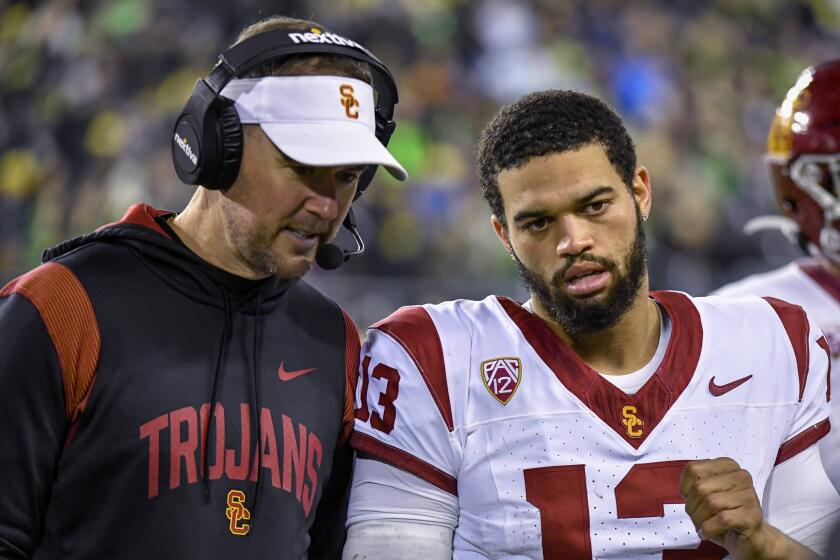Lucas: Last Shot at Cleaning Up His Life in NBA
They started chanting for John Lucas early in the fourth quarter last Friday night at the Houston Summit, once the Rockets had opened a big lead over Portland and Coach Bill Fitch already had substituted liberally.
Then, with three minutes left, when many in the sellout crowd normally would have been leaving to beat the traffic, the chants exploded into a fervent standing ovation as Lucas, at last, was sent into the game.
Lucas was making his latest comeback from an addiction to cocaine that has nearly ended his otherwise creditable career in the National Basketball Assn. The Rocket point guard had spent 40 days in a Southern California drug rehabilitation center after a urinalysis last December showed traces of cocaine in his system. It was not the first time Lucas had undergone that kind of treatment.
The warm reaction of the home crowd last Friday was more a show of support than of forgiveness, a token of concern rather than hero worship.
By now, though, anyone familiar with Lucas’ story knows that all the support that can be mustered for him, although probably helpful, will not prevent a relapse. Even Lucas, who had pronounced himself drug-free twice in the last four years, did not make any promises at last week’s press conference announcing his new contract.
“I realize I am sick,” Lucas said. “I have an illness. I would never admit that before. I didn’t want to admit before that I had a problem I couldn’t handle.”
The Rockets have inserted a clause in Lucas’ new three-year contract, hoping it will help him fight the temptation to return to drugs. Lucas now makes the NBA minimum of $65,000, but will get a $100,000 bonus for each of the next three seasons if he remains drug-free.
The bonus, however, will be deferred until six years after the end of his playing career. If at any time during that span Lucas is found using drugs, he will lose the bonus, which will then be donated to a drug-treatment center.
Lucas stands to lose a lot more than that, though, if he doesn’t stay drug-free. Under the terms of the NBA’s drug policy, adopted in January, 1984, a player can voluntarily seek help at a treatment center twice and still be eligible to play. But if it happens a third time, he is expelled from the league for at least two years and possibly for life.
Since Lucas was caught, rather than turning himself in, the NBA charged him with two strikes in his most recent episode.
So, this is his last chance.
The tough part begins now that Lucas is back on the road with the Rockets. There were no standing ovations at the Forum Tuesday night when the Rockets played the Lakers, and there probably won’t be any tonight when they meet the Clippers at the Sports Arena. If Lucas is lucky, hecklers in visiting crowds will be few.
On Dec. 9, when the Rockets waived Lucas, he told a gathering of Houston reporters that he couldn’t handle life on the road--a vagabond existence that often is more boring than glamorous. Now, there undoubtedly will be the added burden of facing the media in every city.
After last Friday’s game, Lucas stood in front of his locker and talked to reporters about his feelings upon his return to the NBA. He did not discuss specifics about his treatment.
“I was a little nervous about how the fans would react,” Lucas said. “But I was prepared to deal with anything. Those fans out there weren’t the ones who messed up. I messed up. It was great just to be out on the floor again, but it did feel a little strange.
“I love this city (Houston). It really makes me feel good to get that kind of response. Everybody here realizes what happened and you go on. I’m just grateful to be back playing. It’s not my doing. Somebody greater, God, made this possible.”
Before last weekend, it had been 72 days since Lucas had stepped onto a basketball court as a Rocket. In that last previous performance, Lucas had scored 17 points and had contributed nine assists against Portland before the Rockets got the result of his drug test and waived him.
For the last month before being re-signed, Lucas had worked out at the Summit but not as a part of the team. So, his weekend playing time--2 minutes 51 seconds Friday against Portland and 6 minutes Saturday against Washington--was the extent of his workouts with the Rockets until Monday’s practice.
“I’m in shape, but I need to get my timing and defense back,” Lucas said. “But hey, 72 days ago, I didn’t think I’d ever be back.”
It was once believed that the Rockets would fizzle without Lucas around to feed the ball to the Twin Towers--Ralph Sampson and Akeem Olajuwon. But going into Tuesday’s game with the Lakers, the Rockets had won 10 of their last 13 games with Lionel Hollins starting at point guard.
“Right now, I’m the fourth point guard,” Lucas said. “To get back to the starting lineup, I’ll have to beat out Craig Ehlo, Allen Leavell and then Lionel Hollins. I just want to contribute.”
Judging by what Rocket players and management say, however, it seems only a matter of time until Lucas returns to the starting lineup.
Said Sampson: “He gives us a great point guard that knows how to get us (him and Olajuwon) the ball. On the court, he’s a leader. We have a lot of veteran backcourt players, and it will help us with (John) back.”
Said General Manager Ray Patterson: “The good basketball teams are the ones who have many players who are factors in a game. John gives us another factor. He’s a point guard that gets everybody into the action. There was a time when we had no factors on this team. Now, we have three or four.”
Added Fitch: “We’re not going to put pressure on John. The worst thing to do is rush him back. The big thing John needs to do is play his way back into shape and also get back mentally.”
There was a time this season when Fitch vowed that Lucas would never play for the Rockets again. On Dec. 9, he told Fran Blinebury of the Houston Chronicle: “I think John understands the situation. He has had a problem and doesn’t want to become drug dependent again. His career is over with the Rockets.”
But at last Tuesday’s press conference, Fitch said: “John asked me to keep an open mind. I told John that if he goes wrong again, I’ll just have to buy the rope because there will be a lot of people standing in line waiting to use it on him. But I’m confident he will not go wrong.”
Considering Lucas’ drug history, nobody can be sure he’ll stay clean. His problems apparently began during the 1980-81 season when he was suspended by Golden State for the last eight games after he had missed buses and practices. He later received counseling for depression.
After being traded to Washington during the off-season, Lucas underwent treatment for cocaine dependency in November, 1981. Two years later, Lucas was waived by Washington after missing three practices. He was apparently clean in December, 1983, when San Antonio signed him. He played out his option with the Spurs, and the Rockets signed him last October. Two months into the season, he was caught in a routine exam provided for in his contract, announced his retirement and was waived.
“I was 31 years old trying to act like 22 this year,” Lucas said Friday. “I didn’t handle my responsibilities, so I paid the price, a big price.”
Talking specifically about his drug problem at a press conference last week, Lucas said: “I thought staying straight before meant being able to have a couple of beers. But I’ve found out that isn’t the case. Now, I’m attending meetings and getting support. I know I’ve got 14 friends on this team that I will stay very close to.”
Apparently, Lucas will stay very close to Sampson, the Rockets’ captain. Sampson is rooming next to Lucas on the road and has offered to help Lucas in any way possible. But, as Lucas has said, he is the only person he can rely on.
“About 30 minutes of pleasure has caused me a great deal of pain,” Lucas said. “I hope it’s behind me for good.”
More to Read
Go beyond the scoreboard
Get the latest on L.A.'s teams in the daily Sports Report newsletter.
You may occasionally receive promotional content from the Los Angeles Times.










